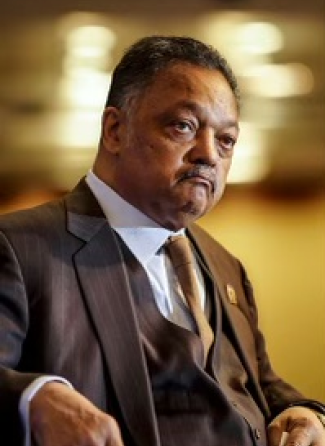 Known for the inspirational quote, Keep Hope Alive, Jesse Louis Jackson is an American political activist, Baptist minister, and politician born on October 8, 1941 in Greenville, SC. He was a candidate for the Democratic presidential nomination in 1984 and 1988 and served as a shadow U.S. Senator for the District of Columbia from 1991 to 1997. Living under Jim Crow segregation laws, Jackson was taught to go to the back of the bus and use separate water fountains—practices he accepted until the Montgomery bus boycott of 1955.
Known for the inspirational quote, Keep Hope Alive, Jesse Louis Jackson is an American political activist, Baptist minister, and politician born on October 8, 1941 in Greenville, SC. He was a candidate for the Democratic presidential nomination in 1984 and 1988 and served as a shadow U.S. Senator for the District of Columbia from 1991 to 1997. Living under Jim Crow segregation laws, Jackson was taught to go to the back of the bus and use separate water fountains—practices he accepted until the Montgomery bus boycott of 1955.He attended the racially segregated Sterling High School in Greenville, where he was elected student class president, finished tenth in his class, and earned letters in baseball, football and basketball. Upon graduating from high school in 1959, he rejected a contract from a minor league professional baseball team so that he could attend the University of Illinois on a football scholarship. After his second semester at that predominantly white school, Jackson transferred to North Carolina Agricultural and Technical State University (N.C.A&T) , a historically black university in Greensboro, North Carolina. At N.C.A&T, Jackson played quarterback and was elected student body president. He became active in local civil rights protests against segregated libraries, theaters and restaurants.
He graduated with a Bachelor of Science (B.S.) degree in sociology in 1964, then attended the Chicago Theological Seminary on a scholarship. He dropped out in 1966, three classes short of earning his master’s degree, to focus full-time on the civil rights movement. He was ordained a minister in 1968, and in 2000 was awarded a Master of Divinity Degree based on his previous credits earned plus his life experience and subsequent Civil rights activism. His activities as a civil rights activist include: The Greenville Eight, the Southern Christian Leadership Conference (SCLC) and Operation Breadbasket, the October 1971 Black Expo, Operation PUSH and the Rainbow Coalition International activism (1980-1990). Jackson’s influence extended to international matters in Syria, Cuba, Kenya, Belgrade, London, Northern Ireland, Belfast, Venezuela, the United Kingdom, Malaysia and Thailand.
Jesse Jackson has received numerous awards and recognition. Ebony Magazine named Jackson to its “100 most influential black Americans” list in 1971. In 1979, Jackson received the Jefferson Award for Greatest Public Service Benefiting the Disadvantaged. In 1989, he was awarded the Spingarn Medal from the NAACP.
In 1991, Jackson received the American Whig-Cliosophic Society’s James Madison Award for Distinguished Public Service. In 1999, he received the Golden Doves for Peace journalistic prize issued by the Italian Research Institute Archive Disarmo. Clinton awarded Jackson the Presidential Medal of Freedom, the nation’s highest honor bestowed on civilians in August 2000. In 2002, scholar Molefi Kete Asante included Jackson on his list of 100 Greatest African Americans. In 2008, Jackson was presented with an Honorary Fellowship from Edge Hill University. In an AP-AOL “Black Voices” poll in February 2006, Jackson was voted “the most important black leader”. Jackson inherited the title of the High Prince of the Agni people of Côte d’Ivoire from Michael Jackson. In August 2009, he was crowned Prince Côte Nana by Amon N’Douffou V, King of Krindjabo, who rules more than a million Agni tribespeople.
Jesse Jackson has been married to Jacqueline L. Jackson over fifty plus years, and they have five children.
